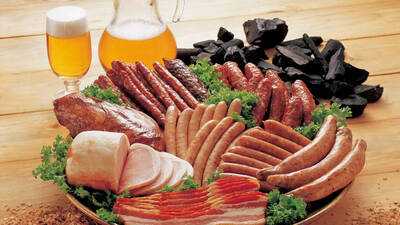Do you often struggle with cramps, discomfort and bloating during periods? Then you need to stop and read this! Stomach discomfort and bloating is a common problem many women face during their menstrual cycle, which can be triggered due to consumption of several foods. Here are nine foods that may lead to bloating during periods, and here are some tips for managing this discomfort and bloating. Read on to find out more about these foods…
Salty Foods
High sodium intake can lead to water retention, causing bloating. During menstruation, hormonal changes already promote fluid retention, and adding salty foods can worsen this effect. Processed snacks, canned soups, and fast foods are typically high in salt. To manage bloating, choose fresh, whole foods and season with herbs instead of salt.

Dairy Products
Many women experience lactose intolerance, which can lead to bloating, gas, and cramps. During periods, the digestive system can become more sensitive, making it harder to process dairy. Milk, cheese, and yogurt may exacerbate bloating. Opting for lactose-free dairy alternatives or nondairy sources of calcium, like leafy greens, can be beneficial.
Cruciferous Vegetables
Vegetables like broccoli, cauliflower, and Brussels sprouts are high in fiber and contain sugars that can lead to gas production during digestion. The hormonal changes of menstruation can heighten sensitivity to these effects. Cooking these vegetables can help break down compounds that cause gas, making them easier to digest.

Legumes
Beans, lentils, and chickpeas are nutritious but can also cause bloating due to their high fiber content and oligosaccharides, which can produce gas. This effect can be more pronounced during menstruation. Soaking legumes before cooking can reduce gas-producing compounds, and gradually increasing fiber intake can help your body adjust.
Carbonated Drinks
The carbonation in sodas and sparkling water introduces gas into the digestive system, which can lead to bloating. Sugary or artificially sweetened beverages may further exacerbate the issue. Opting for still water or herbal teas can provide hydration without bloating.
Processed Foods
Processed foods often contain additives and unhealthy fats that can irritate the digestive system, contributing to bloating. Foods like chips, packaged meals, and sugary snacks can be particularly troublesome. Focusing on whole foods like fruits, vegetables, whole grains, and lean proteins may help in supporting digestive health and reduce bloating.

Wheat and Gluten Products
For those with gluten sensitivity or celiac disease, wheat products can lead to bloating and discomfort. Even those without a diagnosis may struggle to digest gluten during hormonal fluctuations. Bread, pasta, and baked goods can be problematic. Considering gluten-free alternatives, such as quinoa and rice, may help alleviate symptoms.
High-Fat Foods
Foods high in unhealthy fats can slow down digestion, leading to feelings of fullness and bloating. During menstruation, digestive sluggishness may worsen this effect. Fried foods, fatty meats, and rich desserts are common culprits. Instead, choosing healthy fats from sources like avocados and nuts can be easier on the stomach.

Sugar and Artificial Sweeteners
Sugar can lead to fermentation in the gut, resulting in gas and bloating. Additionally, artificial sweeteners like sorbitol and xylitol can have a laxative effect, contributing to discomfort. Limiting candies, baked goods, and diet sodas while opting for natural sweeteners in moderation can help manage bloating.
Foods that can heal bloating during periods
Cramps, pain and discomfort during periods are common concerns, but you will be amazed to know that there are certain foods in your kitchen that can help in healing the discomfort and provide faster relief. Including certain foods like ginger can soothe the digestive system; on the other hand, peppermint is known for its muscle-relaxing properties. Interestingly, bananas are beneficial due to their potassium content, which helps counteract sodium and reduce water retention. Lastly, adding probiotic-rich yogurt/curd to the diet helps in promoting gut health, while hydrating cucumbers can flush out excess sodium.
Conclusion
In a nutshell, it can be concluded that it is essential to identify the foods that can trigger digestive discomfort and may lead to bloating during your menstrual cycle. However, avoiding these foods can help you make better dietary choices. In fact, health experts suggest that just by being mindful of the food you consume during this time, you can keep the discomfort at bay.
Salty Foods
High sodium intake can lead to water retention, causing bloating. During menstruation, hormonal changes already promote fluid retention, and adding salty foods can worsen this effect. Processed snacks, canned soups, and fast foods are typically high in salt. To manage bloating, choose fresh, whole foods and season with herbs instead of salt.
Dairy Products
Many women experience lactose intolerance, which can lead to bloating, gas, and cramps. During periods, the digestive system can become more sensitive, making it harder to process dairy. Milk, cheese, and yogurt may exacerbate bloating. Opting for lactose-free dairy alternatives or nondairy sources of calcium, like leafy greens, can be beneficial.
Cruciferous Vegetables
Vegetables like broccoli, cauliflower, and Brussels sprouts are high in fiber and contain sugars that can lead to gas production during digestion. The hormonal changes of menstruation can heighten sensitivity to these effects. Cooking these vegetables can help break down compounds that cause gas, making them easier to digest.

Legumes
Beans, lentils, and chickpeas are nutritious but can also cause bloating due to their high fiber content and oligosaccharides, which can produce gas. This effect can be more pronounced during menstruation. Soaking legumes before cooking can reduce gas-producing compounds, and gradually increasing fiber intake can help your body adjust.
Carbonated Drinks
The carbonation in sodas and sparkling water introduces gas into the digestive system, which can lead to bloating. Sugary or artificially sweetened beverages may further exacerbate the issue. Opting for still water or herbal teas can provide hydration without bloating.
Processed Foods
Processed foods often contain additives and unhealthy fats that can irritate the digestive system, contributing to bloating. Foods like chips, packaged meals, and sugary snacks can be particularly troublesome. Focusing on whole foods like fruits, vegetables, whole grains, and lean proteins may help in supporting digestive health and reduce bloating.
Wheat and Gluten Products
For those with gluten sensitivity or celiac disease, wheat products can lead to bloating and discomfort. Even those without a diagnosis may struggle to digest gluten during hormonal fluctuations. Bread, pasta, and baked goods can be problematic. Considering gluten-free alternatives, such as quinoa and rice, may help alleviate symptoms.
High-Fat Foods
Foods high in unhealthy fats can slow down digestion, leading to feelings of fullness and bloating. During menstruation, digestive sluggishness may worsen this effect. Fried foods, fatty meats, and rich desserts are common culprits. Instead, choosing healthy fats from sources like avocados and nuts can be easier on the stomach.
Sugar and Artificial Sweeteners
Sugar can lead to fermentation in the gut, resulting in gas and bloating. Additionally, artificial sweeteners like sorbitol and xylitol can have a laxative effect, contributing to discomfort. Limiting candies, baked goods, and diet sodas while opting for natural sweeteners in moderation can help manage bloating.
Foods that can heal bloating during periods
Cramps, pain and discomfort during periods are common concerns, but you will be amazed to know that there are certain foods in your kitchen that can help in healing the discomfort and provide faster relief. Including certain foods like ginger can soothe the digestive system; on the other hand, peppermint is known for its muscle-relaxing properties. Interestingly, bananas are beneficial due to their potassium content, which helps counteract sodium and reduce water retention. Lastly, adding probiotic-rich yogurt/curd to the diet helps in promoting gut health, while hydrating cucumbers can flush out excess sodium.
Conclusion
In a nutshell, it can be concluded that it is essential to identify the foods that can trigger digestive discomfort and may lead to bloating during your menstrual cycle. However, avoiding these foods can help you make better dietary choices. In fact, health experts suggest that just by being mindful of the food you consume during this time, you can keep the discomfort at bay.
You may also like

Boycott ABC petition launched after Jimmy Kimmel pulled from schedule

Jimmy Kimmel's future in doubt as huge ABC contract set to expire

David Letterman reveals Jimmy Kimmel's reaction after show axed over Charlie Kirk row

BBC Question Time applaud after guest's brutal one-word dig at Donald Trump

2.5 kg baby undergoes life-saving lung surgery at AIIMS Delhi






